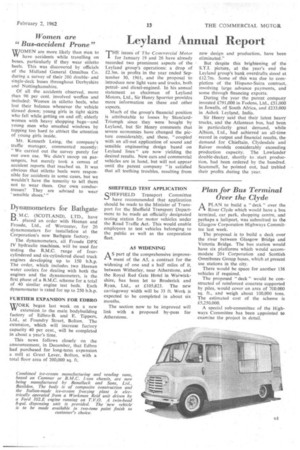Leyland Annual Report
Page 55

If you've noticed an error in this article please click here to report it so we can fix it.
THE issues of The Commercial Motor for January 19 and 26 have already recorded two prominent aspects of the Leyland group's operations: a drop of £2.3m. in profits in the year ended September 30. 1961, and the proposal to introduce new light vans and trucks, both petroland diesel-engined. In his annual statement as chairman of Leyland Motors, Ltd., Sir Henry Spurner provides more information on these and other aspects. Much of the group's financial position is attributable to losses by StandardTriumph since they were bought by Leyland, but Sir Henry comments that severe economies have changed the picture considerably, and these, "coupled with an all-out application of sound and sensible engineering design based on Leyland lines" are now yielding the desired results. New cars and commercial vehicles arc in hand, but will not appear until the parent company "is satisfied that all teething troubles, resulting from new design and production, have been eliminated." But despite this brightening of the S.T.I. picture, at the year's end the Leyland group's bank overdrafts stood at £12.7m. Some of this was due to completion of the Hispano-Suiza contract, involving large advance payments, and some through financing exports. During the year the parent company invested £791,000 in Fodens, Ltd., £51,000 in Jeweils, of South Africa, and £233,000 in Ashok Leyland, India. Sir Henry said that their latest heavy trucks, and the Atlanteart bus, had been in particularly great demand, while Albion. Ltd., had achieved an all-time record in output and financial results, the demand for Chieftain, Clydesdale and Reiver models considerably exceeding production capacity. The Lowlander double-decker, shortly to start production, had been ordered by the hundred. Scammell, he pointed out, had trebled their profits during the year.




























































































































